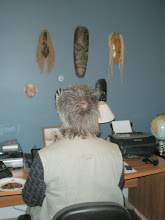Impermanence. Everything changes and nothing lasts forever. In the time it took me to write this the cells in my body have changed and I'm not the same person I was. This is the correct view of life, seeing things as they really are.
When I first started traveling to places that required long flights I would get on the plane with an eye as to how far I was from the noisy bathroom and to the clattering galley, looking suspiciously around at anyone sitting close to me, looking for crying babies and coughing sick people and those idiots who don't bring a book on a plane so they don't have anything to do but talk loudly about nothing at all. I was taking something that was going to change and assigning all kinds of labels to it even though those labels were totally, completely wrong or were themselves going to morph into something different and unexecteed. I was on a long-haul overnight flight when I wanted to get some sleep and found myself close to a fussing baby. My first thought was this: "How can I kill this baby and not get caught?" It was fleeting, of course, but I had to go there because it was the only completely assured solution to the problem. I think it was Oscar Wilde who famously said: "A dead baby is a quiet baby." This is not one of his most memorable quips but the truth of it is without question. Anyway, I am aware that the human body is designed to notice change and to ignore steady state conditions. I found that if I actively listened to the squalling brat my mind would get bored and naturally drift to something else . . . like what kind of Turkish prison would I be put in if I killed a baby, that kind of stuff.
Here's the Buddhist take on things. Let's say a baby is crying. This is nothing more than lovely, complex patterns of vibration that my brain turns into electronic stimulation. Pretty cut and dried. There's no good or bad assigned to the vibrations. But what do I do? I immediately apply a narrative to the "problem" and brainstorm solutions to a transient "situation." The baby probably won't cry for long, anyway. I'll probably get tired and fall asleep despite the noise. But . . . no! I get to work. Should I ask the mother to muzzle the kid? Should I complain to the flight attendant who can do absolutely nothing about it? Maybe I can move to another seat but then I might be next to someone who couldn't explain the concept of deoderant. You see what happens? I take a simple, ephemeral situation and make it into a whole thing, my brain so worked up I couldn't fall asleep even if it was quiet.
Buddhist meditation teaches us how to scrutinize our own perceptual process with great precision. We learn to watch the arising of thought and perception with a feeling of serene detachment. Buddhists view this way of looking at things as a correct view of life and their texts call it "seeing things as they really are."
I do feel the need to assure everyone that I'm not going to kill anything today, let alone a baby. In fact, I'm the kind of guy that can't squash a spider I find in my house. I'll either nudge it onto a sheet of paper, take it outside, and release it into the natural world, unless it's a particularly large or fearsome looking spider at which point I might say some reassuring words to it and wish it well as I back slowly away.
Namaste.

No comments:
Post a Comment